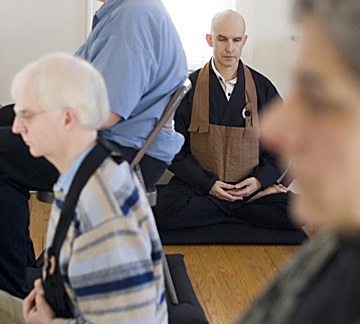Zen center hosts five-day retreat

Resident teacher Elihu Genmyo Smith engages in a sitting meditation with participants at the Prairie Zen Center on Sunday. Last week the center practiced sesshin, a five-day meditation. In addition to the sesshins held six times a year, the Zen Center of Erica Magda
January 28, 2008
Diane Ore wishes she had practiced Zen, or some kind of meditation, 30 years ago.
The 58-year-old Champaign resident, who has been meditating at the Prairie Zen Center, 515 S. Prospect Ave., Champaign, for about a year, said she enjoys the peace and stress relief Zen sittings bring her.
A group of 15 people experienced the calming effects of meditation at the Zen Center from Jan. 16 to Jan. 21 by attending sesshin, a meditation retreat that takes place six times a year.
“(Sesshin) means unified mind, or to touch or contact the mind, with ‘mind’ meaning the nature of being,” Smith said. “It’s bigger than the usual way of thinking of the mind as a mental phenomenon.”
Smith said the main principle of Zen is to teach people how to live in the moment and truly be present within their own lives.
Get The Daily Illini in your inbox!
“It’s very hard to sit and be present because everyone is used to having things entertain them all the time,” Smith said. “One of the things you discover as you sit is how much your mind and body are not present.”
Coming to sesshin allows participants a full day of Zazen, or sitting meditation, beginning at 4:20 a.m.
“There’s something about early morning meditation that’s particularly useful,” Smith said. “Because the mind and body are fresh and refreshed.”
Most participants sit cross-legged on mats in the main room of the Zen Center’s two-story, red brick house.
Smith said they refrain from talking as much as possible throughout the three to five days of sesshin, but they use nonverbal cues such as bells and gongs to signal the beginning or end of meditation periods.
“It’s very unusual compared to the rest of life,” said Rob Ore, a 55-year-old Champaign resident who has been attending the Zen Center for 10 years. “Sesshin is a time to really commit to doing nothing but practicing. It simplifies your life for a time because you don’t have places to go, things to do, except to be present.”
The Zen Center allows people to sleep in its guest rooms and attend the entire sesshin or to attend part time. Rob Ore said he and many others choose to attend part time because they still need to go to work.
Sesshin also includes a work period for participants to cook meals, clean the facility, or do maintenance on the grounds, Smith said. Still, the total meditation time adds up.
“Sesshin is much more intense than a basic sitting,” Rob Ore said. “Because you first sit in the morning starting before 5 a.m. and even with the other activities, it ends up being sitting for at least eight hours.”
Intense periods of meditation may cause discomfort for participants, but Smith said physical pain is part of the learning experience and helps rid people of what he calls “the three poisons: greed, anger and ignorance.”
“Dealing with discomfort is important because one thing you learn is how to deal with discomfort in your life,” Smith said. “You learn how you can be present and intimate with yourself in difficult situations.”
The Zen Center is open to people of all cultures and religions. Rob Ore has a Christian background while his wife, Diane, is Jewish.
Newcomers can attend an orientation session Sundays at 10 a.m. to learn more about practicing Zen.






